By Sarah Macias
Agrarian Spirit by Norman Wirzba comes out in August. You need to pre-order it and our Sunday School classes need to talk about it—perhaps the book in one hand and the Covenant of the Alliance of Baptists in the other. They could actually be great conversation partners. What Wirzba offers is an invitation for us, as followers of Jesus, to regain our “incarnational nerve” as he calls it—to pay attention, connect, and belong to our places, neighborhoods, and communities which is where God dwells. The social, practical, and theological significance of such a reorientation cannot be overestimated.
This book is a primer in agrarian fundamentals, yet it is not a book about being a farmer. Nor is it a romantic, nostalgic lament of how things once were. It is rather a wake-up call to the dishonesty and dangers of the soul/body dualisms and gnostic theologies that are so pervasive in our tradition—and always have been. These are the familiar philosophies that elevate soul over body and mind over living flesh. They are not biblical, and they are not true—but they have a hold on us. They have caused us to look up, up, and away toward a separate and other-worldly heaven instead of “on earth,” where Jesus places us in the Lord’s Prayer. Rather than flying away and fleeing, we are called to touch and connect, in tangible and covenantal ways to our neighborhood and our neighbors.
I am not sure that a life of Christian discipleship can be expressed in any more basic terms. Attending to our places (including our watersheds, as the 2018 Alliance Gathering reminded us) brings us into better relationship with the embodied expressions of God’s love in our midst. This translates into a better understanding of ourselves as participants in the interwoven “meshwork” (a term Wirzba borrows from anthropologist Tim Ingold) of relationality which is undeniably made manifest in our shared lives. Until then we are oblivious to not only where we are but who we are with and, consequently, who we are.
We have fooled ourselves for too long into thinking that we are independent beings at the center of the universe. This inward focus is dangerous and contrary to any agrarian or indigenous wisdom, scriptural or otherwise. From such dis orientated and distorted thinking we can never cultivate community but instead will continue to perpetuate a “slow violence” that undermines the health of all life. Fed by the falsehoods of scarcity and competition rather than kinship and generosity, we are agents of fear rather than communion. As a result, we objectify, commodify, and dispose of people and places. This stems simply from what Wirzba suggests is “a crisis of seeing.”
Could it be that the agrarian God of Scripture offers the reorienting lens that is needed, even and maybe especially to an urban world? Perhaps no institution is more uniquely positioned than our local church to bring us into a posture of affection for the local places in which we live. What if Christians were to take seriously the incarnation of God in Jesus as an agrarian—one who works for the well-being of their places and communities—one who understands that a human life cannot flourish apart from “fertile soil, clean water, abundant green spaces, nutritious food, genuine health care, safe neighborhoods, beautiful homes, child and family support, youth empowerment, inclusion and honoring of the elderly, worthwhile work, and strong traditions of memory.”
We might add our own distinctively local descriptors to this agrarian definition offered by Wirzba. They will only come from paying attention to what is under our feet and all around us. This attentiveness to place will lead us down (not up!) what Wirzba calls a “path of transformation.” To be clear, he advises that this is a path which requires more patience and humility than a road. A road transports us as quickly as possible—away—to another place—and then to another. A path causes us to slow down as we meander around and alongside rocks and rivers as well as local homes, businesses, and schools. On a road, these either would be unnoticed by us or they would have been removed as an obstacle in our way. The slower path offers us fresh eyes then to see both human and more-than-human neighbors in new and meaningful ways.
This shift from an I-It (object) to an I-Thou (subject) relationship is not a new one, but Wirzba cautions that even when viewing others as subjects, it is possible to think of ourselves as “sovereign, self-enclosed, (and) self-standing.” This is where I find the concept he is using of a “meshwork” to describe our place in the world as super helpful. It moves us beyond the over-used descriptions of the world as an interconnected network (which I have used many times) or as a collection of unique and distinctive bodies (a helpful metaphor but also limited). Meshwork thinking undoes any argument of things being connected but separate and self-contained. Instead, it suggests that things are their relations, an inter-weaving of stories, a wondrous and wounded entanglement of people, places, and processes. As such, we are “enmeshed, needy dynamic conduits or vessels through which God’s life creating love can (my emphasis) freely move.”
In contrast to other creatures who instinctively live, become, and belong where they are, we can only choose this posture. It is time that we do so—in intentional and thoughtful ways—and there is a lot at stake if we do not. With the ancient but fresh wisdom of Genesis to Revelation and Maximus the Confessor to Wendell Berry, Agrarian Spirit offers us some basic steps towards a heavenly (on earth) agrarian city. It is a place where we open ourselves to the pains and possibilities of our communities—where we become citizens who are committed, along with a God who becomes flesh, to the flourishing of all people, fellow creatures, and the land upon which we all live. Let us walk on this path together.
The book is available at Notre Dame Press and there is a discount if you order the book this summer from the publisher.
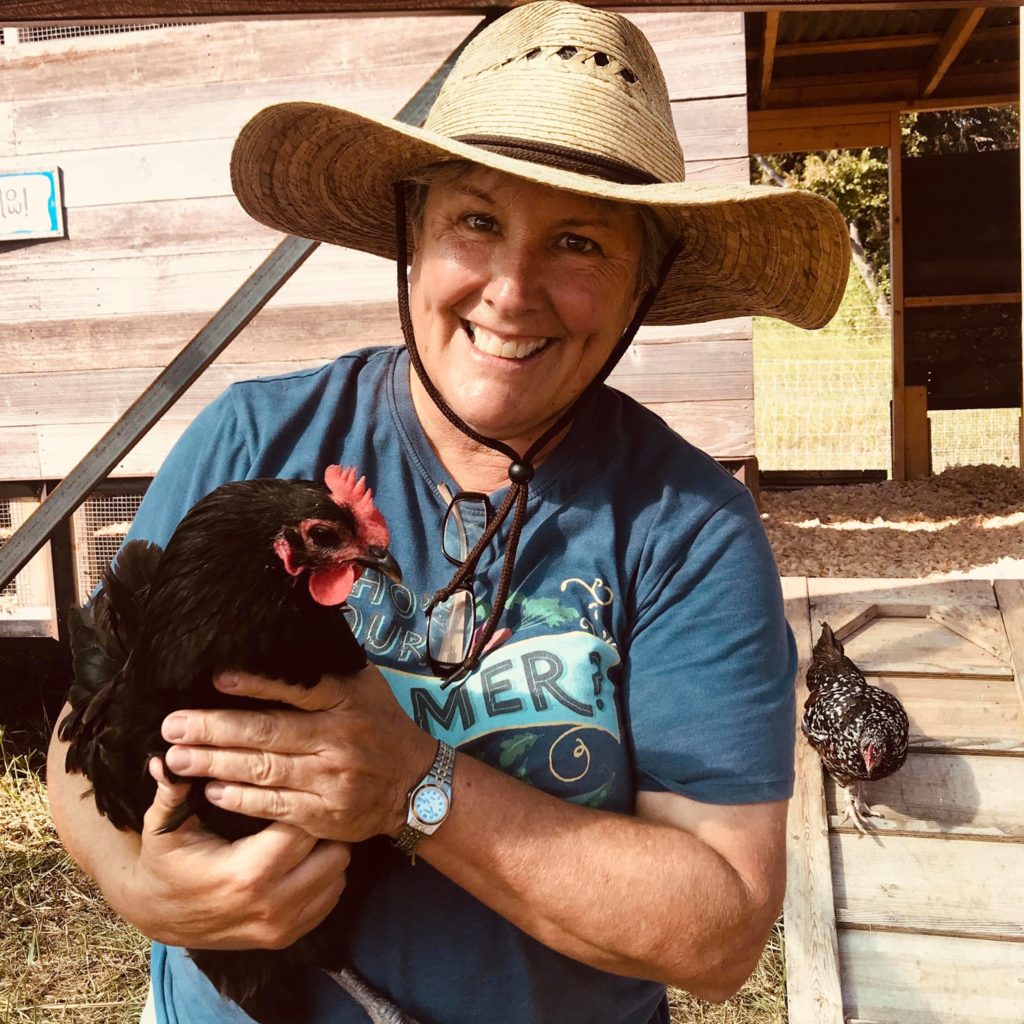
Rev. Sarah Macias is pastoralist/theologian at Sister Grove Farm and is enrolled in the Land, Food, and Faith track of the Doctor of Ministry program at Memphis Theological Seminary. She and her husband Rodney are members of Royal Lane Baptist Church in Dallas, Tex.

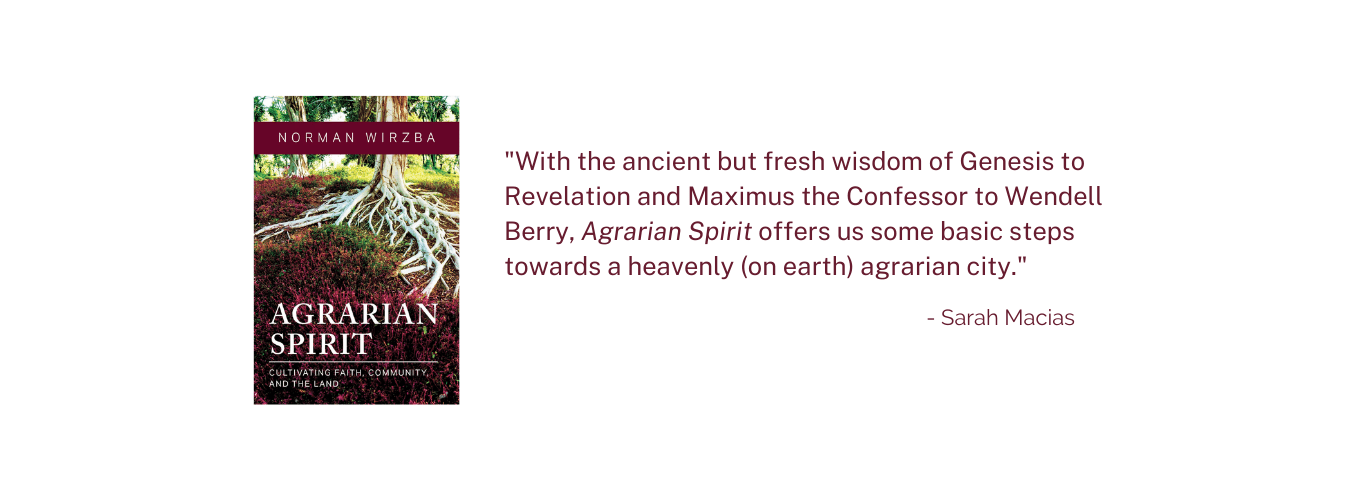
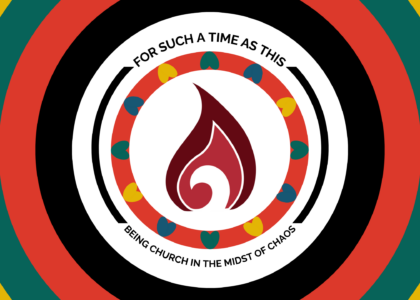
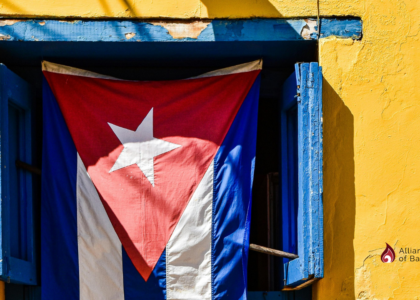
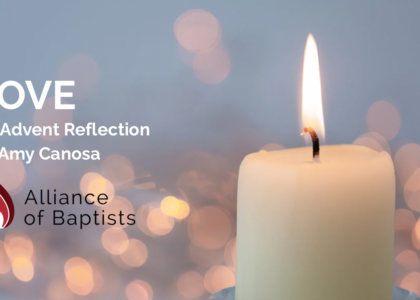
Recent Comments